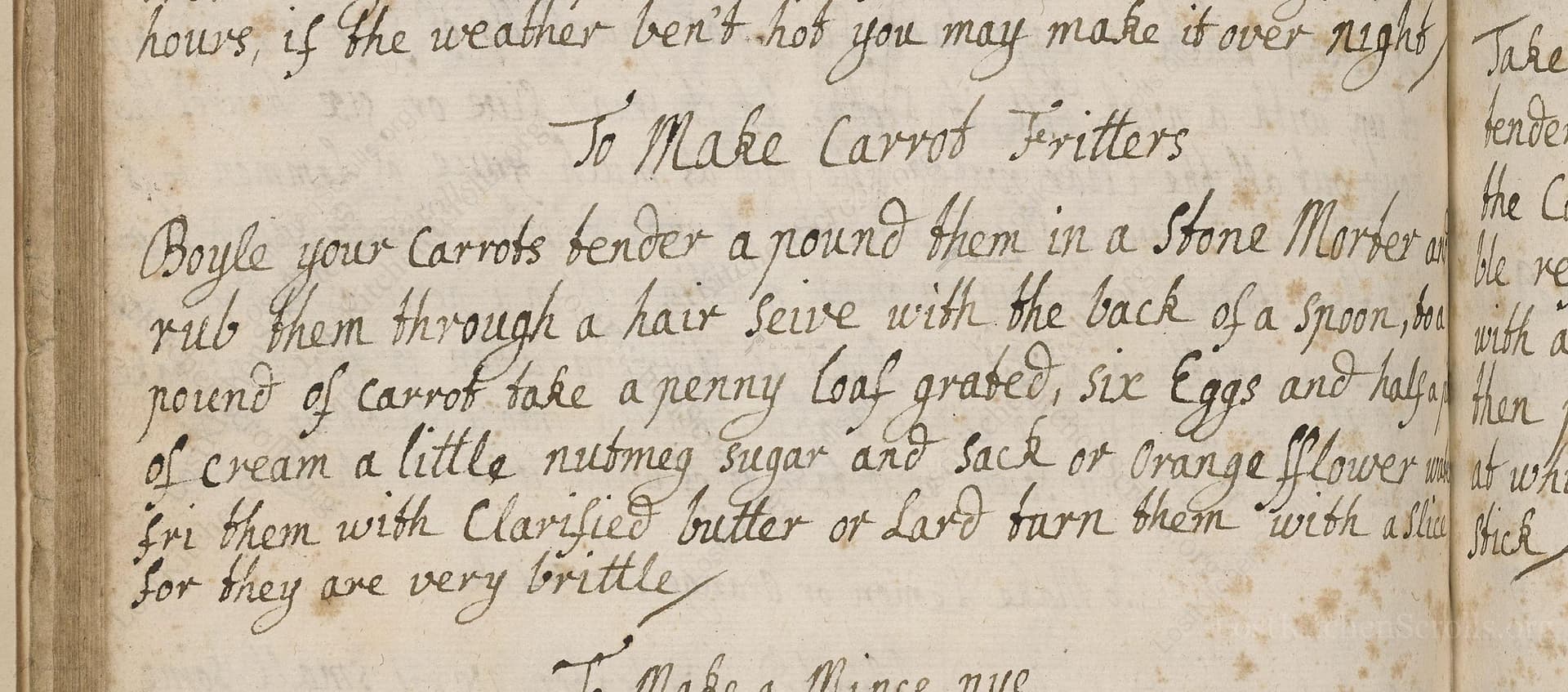To Make Carrot Fritters
From the treasured pages of Receipt book
Unknown Author

To Make Carrot Fritters
"Boyle your Carrots tender a pound them in a Stone Morter and rub them through a hair seive with the back of a spoon, to a pound of carrot take a penny loaf grated, six Eggs and half a pint of cream a little nutmeg sugar and sack or Orange fflower water fri them with Clarified butterr or Lard turn them with a slice for they are very brittle"
Note on the Original Text
The recipe is written in the direct, conversational style typical of early modern cookery books, with few measurements and an expectation that the reader has some kitchen savvy. Spellings like 'boyle' (boil), 'fri' (fry), and 'Carrots tender a pound them...' reveal both the evolving nature of English spelling and the casual, shorthand structure favored by manuscript writers. Quantities are imprecise by today's standards, with 'a penny loaf' referencing the customary small bread of the era. 'Sack' is a historical term for a type of Spanish fortified wine, roughly akin to sweet sherry.

Title
Receipt book (1700)
You can also click the book image above to peruse the original tome
Writer
Unknown
Era
1700
Publisher
Unknown
Background
A delightful glimpse into the kitchens of the early 18th century, this historic culinary manuscript promises a feast of recipes, remedies, and perhaps a pinch of mystery. Expect both practical fare and elegant inspiration for the curious cook.
Kindly made available by
Folger Shakespeare Library
This recipe is drawn from an early 18th-century English manuscript, a time when exotic flavors and creative cookery were blossoming among the upper classes. Sweet and savory dishes often mixed, and the home cook was eager to display skill and hospitality with sophisticated treats like fritters. The use of ingredients such as sack (a type of fortified wine) or orange flower water reflects the era's fascination with imported luxury goods and flavors. Carrots, newly popular and often celebrated for their sweetness, became a feature in pastries and fritters alike.

In the original kitchen, cooks would boil the carrots in a large iron pot, then pound them in a stone mortar with a pestle. The smooth purée was achieved by pushing the mash through a hair sieve with a spoon. Frying was typically done in a heavy pan or skillet over an open hearth, using clarified butter or lard. Fritters were flipped gently with a broad spatula or 'slice,' a flat utensil designed for such delicate work.
Prep Time
20 mins
Cook Time
25 mins
Servings
8
We've done our best to adapt this historical recipe for modern kitchens, but some details may still need refinement. We warmly welcome feedback from fellow cooks and culinary historians — your insights support the entire community!
Ingredients
- 1 lb carrots, peeled and chopped
- 3.5 oz white bread, grated (substitute: plain breadcrumbs)
- 6 large eggs
- 1 cup heavy cream
- Large pinch ground nutmeg
- 1-2 tbsp granulated sugar (to taste)
- 1 tbsp sweet sherry (substitute for sack) OR 1 tbsp orange blossom water
- Clarified butter or mild lard (for frying)
Instructions
- Begin by boiling about 1 pound of carrots until tender.
- Once drained, mash them thoroughly – a food processor or sturdy masher will do!
- Pass the carrot mash through a fine strainer or sieve to create a silky purée.
- Combine the puréed carrots with 3.5 ounces of grated white bread (crusts removed), six large eggs, and 1 cup of heavy cream.
- Add a good pinch of ground nutmeg, 1-2 tablespoons of sugar to taste, and a tablespoon of sweet sherry (as a substitute for sack) or orange blossom water for fragrance.
- Heat clarified butter (or mild vegetable oil) in a frying pan over medium heat.
- Form small patties or drop heaped spoonfuls into the pan.
- Fry gently—these fritters are delicate.
- Use a flat spatula to turn them carefully until golden on both sides.
- Serve warm, perhaps dusted with a sprinkle of extra sugar.
Estimated Calories
210 per serving
Cooking Estimates
We boil and mash the carrots, then mix all the ingredients, form patties, and fry them. Preparation takes about 20 minutes, and cooking takes around 25 minutes. Each fritter serving has about 210 calories, and this recipe makes roughly 8 servings.
As noted above, we have made our best effort to translate and adapt this historical recipe for modern kitchens, taking into account ingredients nowadays, cooking techniques, measurements, and so on. However, historical recipes often contain assumptions that require interpretation.
We'd love for anyone to help improve these adaptations. Community contributions are highly welcome. If you have suggestions, corrections, or cooking tips based on your experience with this recipe, please share them below.
Join the Discussion
Rate This Recipe
Dietary Preference
Main Ingredients
Occasions

Den Bockfisch In Einer Fleisch Suppen Zu Kochen
This recipe hails from a German manuscript cookbook compiled in 1696, a time whe...

Die Grieß Nudlen Zumachen
This recipe comes from a rather mysterious manuscript cookbook, penned anonymous...

Ein Boudain
This recipe comes from an anonymous German-language manuscript cookbook from 169...

Ein Gesaltzen Citroni
This recipe, dating from 1696, comes from an extensive anonymous German cookbook...
Browse our complete collection of time-honored recipes



